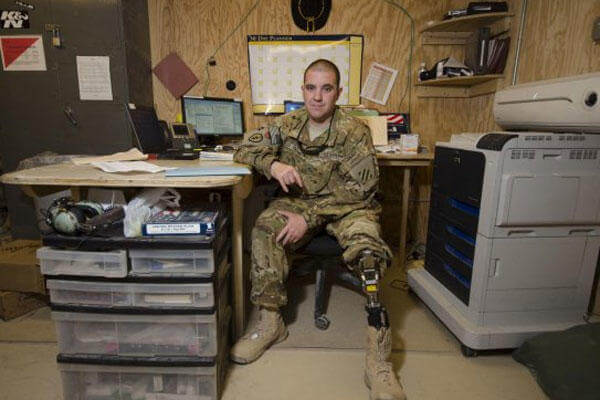KANDAHAR AIRFIELD, Afghanistan - It's clear from the way Staff Sgt. Brandon Vilt moves around the maintenance bay of Delta Troop, 3rd Squadron, 17th Cavalry Regiment, Task Force Lighthorse, that he has his mission in mind. An OH-58 "Kiowa" helicopter crew chief responsible for the maintenance of the troop's fleet, he and his soldiers keep the "moshshe"-Pashtu for mosquito because of its bite and illusiveness, and the nickname for the Kiowa-flying to bring the fight to the enemy.
"I just want to make sure my guys put out a good, quality product," said Vilt, a Cameron Park, Calif., native.
Not only is he responsible for the soldiers on the maintenance bay floor, but he's also a platoon sergeant. If he's not overseeing the maintenance of Kiowas, he's up in the office loft doing administrative work for his soldiers.
Vilt moves up the stairs to his office. The motivation in each upward step ignites a spark of inspiration among his coworkers, but he's too humble to show his discomfort if he had any.
"Stairs are the worst," he says, collapsing into his office chair. A prosthetic leg hangs on the rear wall. Vilt rolls up his left pant leg to reveal the prosthesis helping him accomplish the mission at Kandahar Airfield, Afghanistan.
Vilt, who lost his leg during his first deployment to Iraq in 2007, said he decided to deploy a second time with Task Force Lighthorse and Task Force Falcon, 3rd Combat Aviation Brigade, because he simply loves what he does.
He was guarding an entry control point when a truck came barreling through and caused the cement barriers on either side of the road to topple. One fell on him.
"All I could think in the moment was, 'Get this thing off of me!'" he said. "It was surreal to be told the leg was gone for good."
He underwent surgery and physical therapy at the Bob Wilson Naval Hospital in San Diego, Calif. While there he considered leaving the Army, but his experiences as a squad leader in the Warrior Transition Battalion reminded him of his love for soldiering-and helicopters.
"I was always in good spirits," he said. "I just thought, 'I got to get back to aviation.'"
He did, becoming an advanced individual training instructor in the U.S. Army Aviation Center of Excellence at Joint Base Langley-Eustis, Va. He arrived at Hunter Army Airfield, Ga., in Sept. 2011.
First Sgt. Paul Julien, the Delta Troop first sergeant, said that Vilt's resilience and positive outlook make him a beacon to soldiers and peers throughout the Task Force.
"He's a pleasure to be around," said Julien. "He's an outstanding leader of soldiers, dedicated to their development-they respect what he's been through, his ability to overcome all that and stay motivated."
Julien recalled a particularly difficult troop run when Vilt's determination galvanized his fellow soldiers.
"Everyone was struggling," he said. "And then, out of nowhere, Staff Sgt. Vilt runs up to the formation. The amount of motivation for the troops was indescribable."
Though Pfc. Andrew Wegner, a Kiowa maintainer and one of Vilt's Soldiers, was not yet with the unit for that run, he was regaled with stories of Staff Sgt. Vilt at the USAACE schoolhouse.
As is often the case, there's a difference between the man and the legend preceding him, but Wegner said meeting Vilt revealed both Vilt's down-to-earth demeanor and his dedication to the mission.
"His mentality is different," said Wegner, a Fort Bragg, Calif., native. "He's a relaxed guy, but he gives it his all. He gets up there and does all the maintenance like the rest of us. He doesn't let the leg stop him."
Vilt keeps his motivation with a three-step approach: openness, communication, and humor.
Where Wegner and others were once wary to broach the subject of his leg, now it's just one more topic in the good-natured ribbings among fellow soldiers. For his part, Vilt said he doesn't tire of using his prosthesis for the occasional practical joke.
"I mean, I miss my leg, but I might as well have fun with this one," he said.
Though the atmosphere is light, accomplishing the mission is still the Delta Troop soldiers' top priority. Wegner acknowledged the gravity of both Vilt's injury and securing the future of Afghanistan.
"It is very motivational to know someone can go through such a traumatic experience and still have the drive to stay in the military and deploy," he said. "I'm honored to have him as my first platoon sergeant."
For Vilt, it always has been and always will be equal parts labor and love.
"I still love what I do," he said. "I love my job, I love working with Soldiers. I'm just trying to do my part. I'm still capable, and I feel I have something valuable to add to this mission."



























